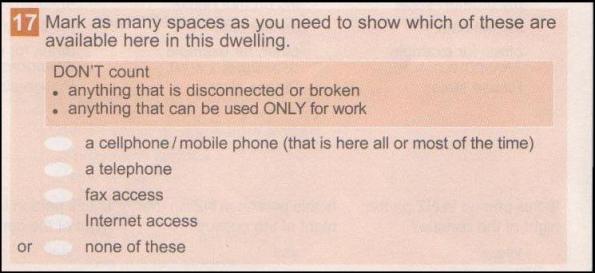Census, Surveys, and Cellphones (Part rua)
.
.
In March this year I wrote on the issue of political polling and cellphone/landline usage. Specifically,
“Part of the problem [of inaccurate poll results] are anecdotal stories that many low income families, students, transients, etc, no longer rely on landlines and use only cellphones. Polling companies do not call cellphones – only landlines. (A low-income family living not far from us fits this demographic group perfectly; no landline; cellphones only. The sole-parent head of the household votes Labour.)”
This year, Statistics NZ included a question pertinent to this issue. They asked households to disclose their landline, cellphone, fax, and internet usage.
This was Question 17,
.
.
I stated then,
“The question asks the respondent to “mark as many spaces as you need to show which of these are available here in this dwelling”.
What will prove interesting is not whether or not “a cellphone/mobile” is marked – but how many households will mark “a telephone”.
This will finally give us a clearer understanding what percentage of households do not have a landline.”
Yesterday (3 December 2013), Statistics NZ released the result of that question. The impact on political polling firms and their methodologies will no doubt be considerable;
.
Three-quarters of households now have Internet access
-
Internet access at home continued to rise, at 76.8 percent in 2013, compared with 60.5 percent in 2006 and 37.4 percent in 2001.
-
Cellphone access also increased, with 83.7 percent of households in 2013 having access to a cellphone at home, compared with 74.2 percent in 2006.
-
Access to a landline telephone decreased. In 2013, 85.5 percent of households had access to a landline telephone at home, down from 91.6 percent in 2006.
-
Fax access decreased. In 2013, 14.6 percent of households had access to a fax, down from 26.0 percent in 2006.
-
A small percentage of households (1.6 percent or 24,135 households) did not have access to any telecommunication systems at home. That is, they did not have a landline telephone, cellphone, Internet access, or a fax.
.
Note that only “85.5% of households had access to a landline telephone at home, down from 91.6% in 2006”.
This means that 14.5% of households did not have access to a landline.
Subtract 1.6 percentage points from 14.5 percentage points as not having access to any telecommunication systems at home at all – and the implication is that 12.9% of households rely on some medium of communications other than landlines: ie, cellphones.
In my March blogpost, I predicted,
“If the numbers of households without a landline are significant (+/- 10%), then polling companies will either have to adjust their polling techniques – or be rendered useless. Without factoring in cellphone-only households, polling companies risk becoming an expensive ‘parlour game’ with little value.”
12.9% is a pretty fair indication of households that cannot afford (or have no need) of landlines, and rely solely on cellphones for communications.
Low income families may not necessarily have credit on their cellphones – but that does not prevent polling companies from phoning in, to cellphone owners. As I blogged on 1 September, when Roy Morgan phoned me on my cellphone (see: Mr Morgan phoned).
The up-shot of this census result is twofold;
- As the only pollster to call respondants’ cellphones, Roy Morgan is the most credible polling company and the one to watch.
- Expect other polling companies to follow suit and call respondants via their cellphones – or risk being ignored and becoming irrelevant.
Meanwhile…
The latest Roy Morgan poll (11-24 November 2013) had the following results;
National-led bloc,
National – 44.5%
Maori Party*** – 1.5%
ACT* – 0.5%
United Future*** – 0.5%
Total National-led Bloc – 47%
Labour-led bloc,
Labour – 34%
Greens – 11%
Mana*** – 1%
Total Labour-led bloc – 46%
Wild cards,
Conservative Party** – 2%
NZ First – 3.5%
* ACT – not expected to survive the 2014 election.
** Conservative Party – not currently represented in Parliament
*** Electorate-based Party only
With the survival of electorate-based ACT and the Maori Party in question, and Colin Craig’s fun-loving religious Party needing active support from the Nats to win an electorate seat to gain seat(s) in Parliament, the 47% figure for the National bloc is misleadingly high.
Parties to watch in the run-up to the next election: NZ First and the Conservative Party.
This blogpost was first published on The Daily Blog on 5 December 2013.
.
*
.
Sources
Stats NZ: Release Calendar
Stats NZ: 2013 Census QuickStats about national highlights – Phone and Internet access
Previous related blogposts
Census, Surveys, and Cellphones
Dodgy polls, dodgy dealings, and a spot of fear-mongering
.
.
= fs =




HI. I was reading your article on polling (on the daily blog site) and thought that would mention that the BC election of May 2013 was a pollsters’ disaster. Every major poll was wrong by much more than the margin of error – leaving everyone (or at least all skeptics) to wonder (a) if the election was rigged (and thus the polls were wrong) or (b) the election was correct and the polls were rigged.
With respect to land lines, many households will retain the land line for a monitored alarm system. Wireless (ie off the grid) monitoring is increasingly common but requires capital outlay (over $1000). I suspect that only the well off have alarm systems and only the comfortably well off have monitored alarm systems (although in Vancouver an alarm system must be monitored). This would suggest that those with land lines are both older (as home owners) and richer than those without. However, they may not be Conservative Party supporters as they do not rely on faith to protect their stuff?
Nadine McDonnell
In November, I worked in a call centre, phoning people for the Reid Research/3 News poll (the results of which afaik, were never broadcast, as they gave the ‘wrong’ answer on asset sales – most people including NACT voters) were against them. If the wanted person was not available (x amount of each sex/age/ethnic group is required) but their relly gave us a mobile number, we weren’t allowed to phone it – management were obsessed with doing the job as cheaply as possible! That is the reason why survey takers can’t phone mobiles, it’s not to exclude poor people etc, It’s money. I have a landline and 2 mobiles (long story) but I never make calls on my mobile – it’s too expensive – I use it only for texting and emergencies should one arise when I am out. I have never understood the idea that the poor don’t have landlines, my experience is the reverse. Running a mobile costs a fortune, landlines ate much cheaper. It seems to me that any poor person who has only a mobile is practising false economy – like using disposable nappies to ‘save’ on laundry costs!
Deb